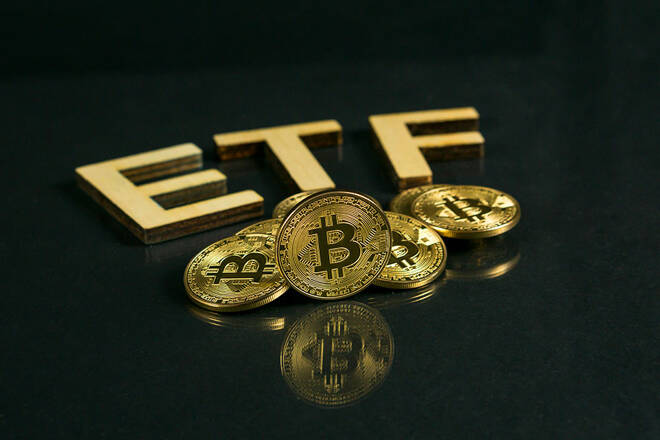Advertisement
Advertisement
Bitcoin ETF Performance Recap: After $116M Inflows, Here’s what to expect in the Week Ahead
By:
Key Points:
- U.S. Spot Bitcoin ETFs performance last week came with with a mix of enthusiasm and setbacks.
- The week commenced on a high note, with US Bitcoin ETFs witnessing a robust influx of $217 million on Monday, May 6
- Grayscale reported over $100 million in outflows, which was pivotal to the laggard Bitcoin price performance during the week.
The week in the U.S. Spot Bitcoin ETFs unfolded with a mix of enthusiasm and setback. On Friday, Grayscale reported over $100 million in outflows, which even could have led to the subsequent Bitcoin price crash. However, these ETF products managed to garner over $116 million in inflows this week owing to the week’s great start.
Bitcoin ETF Weekly Performance: A Recap
The week commenced on a high note, with US Bitcoin ETFs witnessing a robust influx of $217 million on Monday, May 6. This surge highlighted the escalating investor appetite for crypto exchange-traded products.
Moreover, notable contributions came from Grayscale ETF GBTC, which recorded a substantial single-day net inflow of $3.9 million. However, this figure was a lot lesser than the previous trading session’s inflow of $64 million.
Meanwhile, Fidelity’s Bitcoin ETF (FBTC) saw a significant inflow of $99.19 million. However, this momentum faltered as the week progressed, with outflows resuming on Tuesday, May 7. Net outflows of $15.7 million were reported across U.S. Bitcoin ETFs, led by Grayscale Bitcoin ETF GBTC’s $28.6 million outflows.
Despite this setback, Fidelity Wise’s FBTC and WisdomTree’s BTCO ETF managed to garner inflows of $4.1 million and $6 million, respectively. Whilst on Wednesday, May 8, the Spot Bitcoin ETFs witnessed a modest yet positive influx of $11.5 million, with the Bitwise ETF (BITB) emerging as sole contributor. This resurgence indicated a resilient market amidst fluctuating flows.
Conversely, Blackrock’s iShares Bitcoin Trust (IBIT) and Grayscale’s GBTC ETF reported zero flows, signaling a mixed sentiment among investors. The following day, Thursday, May 9, saw significant net outflows totaling $11.3 million in U.S. Spot Bitcoin ETFs, with Grayscale’s GBTC leading the downturn.
Despite negative flows amounting to $43.4 million, GBTC remained a dominant player, showcasing the enduring influence of established entities in the market. In contrast, Blackrock’s IBIT ETF experienced a notable resurgence with $14.2 million in inflows, signaling a shift in investor sentiment.
Furthermore, Friday, May 10, marked another day of outflows, with GBTC reporting $100 million in net outflows. This pushed the total outflows across all Bitcoin ETFs to $84 million. Despite this setback, BlackRock’s ETF IBIT saw a significant inflow of $12.43 million, reflecting continued investor confidence in select ETFs amid market volatility.
The week concluded with Bitcoin’s price slumping to $60,000 on Saturday, May 11, from $63,000. The dip was potentially influenced by the exorbitant outflows witnessed throughout the week. However, despite the turbulence, the overall weekly inflows remained positive at $116.8 million.
Institutional Adoption of Bitcoin Exchange-Traded Funds Soars
Institutional adoption of Bitcoin ETFs is rapidly gaining momentum. It signals a significant shift in traditional finance’s approach towards cryptocurrencies. Throughout the week, prominent banking institutions revealed their exposure to these ETFs. Hence, investors could witness a growing acceptance and integration of digital assets into institutional investment portfolios.
JPMorgan, the world’s largest banking institution, disclosed substantial holdings in various Bitcoin ETFs available in the market. With a diversified investment approach, JPMorgan’s portfolio includes BTC ETFs by BlackRock, Fidelity, and Bitwise. Moreover, it boasts an investment of over $1 million.
Furthermore, the JPMorgan investment is notable since it’s CEO Jamie Dimon repeatedly criticizes Bitcoin but the institution believes otherwise. Wells Fargo, another banking giant, also disclosed its exposure to Bitcoin ETFs in a recent filing with the US Securities and Exchange Commission (SEC). The bank revealed ownership of 2,245 shares of Grayscale Bitcoin ETF (GBTC).
These disclosures underscore a broader trend of institutional players embracing Bitcoin ETFs as viable investment vehicles. Institutional adoption brings with it a myriad of benefits for the cryptocurrency market. It enhances liquidity, stability, and credibility. This paves the way for increased participation from retail investors and further institutional players.
Moreover, market participants can await such declarations in the coming week as well since several 13F filings are due before the May 15 deadline. These disclosures could positively influence investor sentiment, solidifying the position of these ETFs. Furthermore, a resurgence of inflows could be seen.
About the Author
Ibrahim Ajibadeauthor
Ibrahim Ajibade Ademolawa is a seasoned research analyst with a background in Commercial Banking and Web3 startups, specializing in DeFi and TradFi analysis. He holds a B.A. in Economics and is pursuing an MSc in Blockchain.
Advertisement
